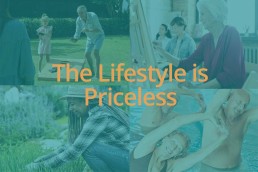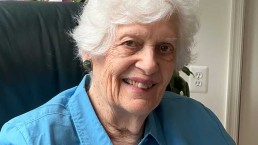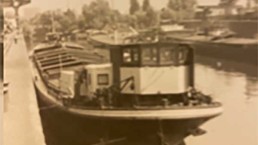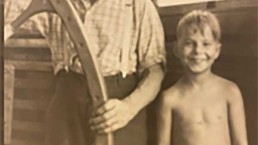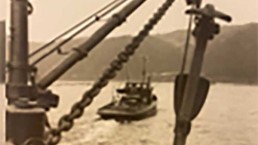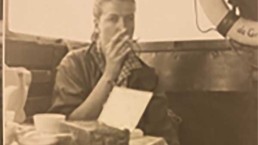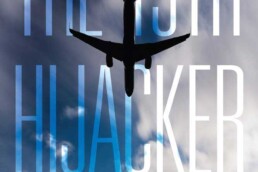In 1959 I led a group of six adults (diverse backgrounds: Montana, California, New York City, etc.) on a month long AYH (American Youth Hostels) tour of Central Europe. I tacked on an extra two weeks to travel on my own at the end of the group tour. A young woman in my group was meeting a friend in Frankfurt, so the 3 of us decided to travel onward together.
On the final night at the Frankfurt hostel, we struck up a conversation which initiated the most unusual travel experience of my life. A fellow hosteller claimed it was possible to hitch a free ride on a Rhine River barge. “Just go to the harbor master’s office in Frankfurt and inquire.”
Deciding we had nothing to lose, by mid-morning we arrived at the gate, each lugging a bedroll and a single backpack. We were given permission to walk along the quay and ask each captain if we could hitch a ride toward Amsterdam. After several turndowns, one captain said “yes”. It was unbelievable this was happening.
We spoke no German and he, his Frau, and their nine-year-old son spoke no English. Somehow we managed to agree we could ride with them, but we only had one hour before they would get underway. Meanwhile, we must buy food supplies (anything not requiring cooking or refrigeration – cold cuts, breads, oranges) and return no later than 1 o’clock. A mad scramble, but we made it.
Then we sat! Hour after creeping hour! It turned out that our barge had no engine, and their tugboat didn’t arrive that afternoon as expected. We didn’t get underway, hitched up to the tug, until dawn the next morning.
We lived and slept up in the small pilot house, sitting and laying on the wood floor, wrapped around the various pieces of equipment. The captain and family had a compact, but larger cabin directly below, and the two-man crew had a tiny cabin of their own at the far-off rear of the long coal-filled barge. There also was a small bathroom (sink and toilet) below our cabin, which was shared by all.
In most places, the riverbanks were filled with shrubbery, so we weren’t gazing into people’s backyards. This meant that during the daytime there was little to do except wave to other barges and boats and observe life on board: laundry drying on lines, perhaps a moped or bike on board for land excursions, children, and pets (dogs, cats, caged birds), potted plants, maybe a grille.
One afternoon the Frau invited us into their cabin for a bowl of homemade hot soup. This was a rare and wonderful treat after unending dry sandwiches. Mostly using sign language and drawing pictures, we learned the family had an apartment in one of the river towns. There the Frau and son lived during the winter months while he went to school. They also had an older daughter who was married to an American and lived in Georgia (perhaps the reason they said “yes” to taking us aboard in the first place). In total, we spent three days going from Frankfurt to Bonn and learned the rhythms of river barging. They anchored grouped together in a wider section of the river every night and moved on early each morning.
Evenings were a social time. Barge families met and greeted old friends. A small grocery boat wove in and out, pulling alongside to sell fresh food items like fruit, vegetables, milk, bread, and soda. The young crew members went rowing off with their buddies.
All told it was a truly unique and memorable travel experience.
Carol moved from Florida to The Woodlands to be close to her family. She stays in touch with friends every week using zoom, Skype, email, and FaceTime. Carol enjoys The Woodlands relaxed lifestyle and treasures her time walking on The Woodlands trails and working in her garden plot which rewards her generously every year. She appreciates The Woodlands library which supplements her regularly scheduled trips to the local library. This fall, Carol is participating in the Senior Olympics in Rummikub with other residents.
